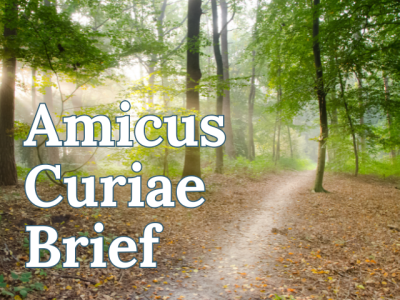
In a case of widespread municipal importance (Echeverria et al v. Town of Tunbridge), two owners of a property in Tunbridge have appealed an Orange County Superior Court ruling that the town has the sole legal authority to determine whether and how to build, maintain, and repair the legal municipal trails located on their property.
A legal trail is defined in statute as a “public right of way that is not a highway and that (A) previously was a designated town highway having the same width as the designated town highway, or a lesser width if so designated; or (B) a new public right-of-way laid out as a trail by the selectmen for the purpose of providing access to abutting properties or for recreational use.” 19 V.S.A. § 301(8).
Until this point, the uncontested conventional legal wisdom has been that selectboards have the exclusive authority to maintain their municipality’s legal trails. The Superior Court affirmed that understanding, and the landowners appealed to the Vermont Supreme Court.
VLCT MAC attorneys have filed with the Supreme Court an amicus curiae brief in support of the town’s position. The Vermont Attorney General’s Office and the Town of Pomfret have joined the fight and have also submitted their own amicus briefs in support of the town’s position.
At the lower court (Court), the plaintiff landowners claimed the legislature removed a municipality’s authority to maintain its legal trails with its 1986 amendments to the road classification statutes, and therefore only the landowners can determine maintenance of legal trails that pass through their property. The Court disregarded this argument, explaining that, as far back as at least 1921, it was clear that towns had authority to build and maintain their public trails. And even though some road “nomenclature change[d]” with the 1986 (and previous) amendments, the Court continued, there was never a suggestion in the legislative history that this authority was stripped from towns. Hence, today, it’s clear that trails “remain[] a form of public easement that the public ha[s] the right to use and that towns ha[ve] the right to build and maintain.” Furthermore, the Court noted that it “would defeat the purpose of a public easement to locate the ‘right to control’ the easement not with the town but rather with the underlying landowner, and thus require the public to bargain with that landowner for the use of the easement.” Finally, citing data from VLCT’s 2024 survey of its members about legal trails in their municipalities, the Court noted the frequency with which towns are maintaining their legal trails for public use and explained that its decision is consistent with “more than a century of both legal precedent and practical experience.”
Despite the Court’s thorough rebuke of their argument as well as the legislative amendment last session that makes it clear that towns have the authority to maintain their legal trails (see pg. 53 of Act 66 of 2025), the plaintiffs are appealing the decision to the Vermont Supreme Court. Because Act 66 is not effective until April 1, 2026, a favorable decision for the landowners before the Supreme Court would only affect trail maintenance performed before that time.
Oral arguments before the Supreme Court in this case are scheduled for 10:45 AM Tuesday, October 14 in Montpelier.
At the request of the Tunbridge selectboard, MAC attorneys have filed with the Supreme Court an amicus curiae brief in support of the town’s position. The Vermont Attorney General’s Office and the Town of Pomfret have joined the fight and have also submitted their own amicus briefs in support of the town’s position. Oral arguments before the Court in this case are scheduled for 10:45 AM Tuesday, October 14 at the Vermont Supreme Court (111 State Street in Montpelier). A decision is expected sometime later this fall.
Kail Romanoff
Staff Attorney II
VLCT Municipal Assistance Center